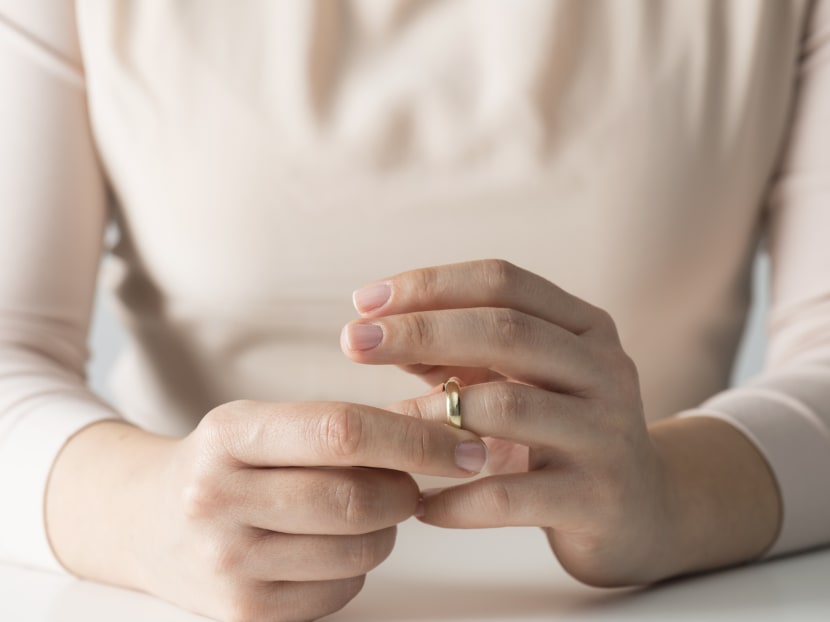What is emotional cheating? Experts on how the pandemic increased risk of infidelity
From pandemic stress to the growing prevalence of dating apps that enable extra-marital affairs, CNA Women takes a look at why people are searching for a connection they can’t find in their own marriages.

Emotional cheating is where one experiences feelings of being in love or having sexual interest with another person that disrupts the investment with the existing partner, an expert says. (Photo: iStock/solidcolours)
It’s been said that when it comes to extra-marital affairs and cheating on their spouses, men are opportunistic while women aren’t. While some women might get into a physical (read: sexual) affair, in many instances, the liaison is an emotional one.
Interestingly, even though an emotional connection can at times be even more intimate than a physical one, some women don’t see this as cheating.
“When it comes to the differences in the way men and women cheat, as well as their motivations for cheating behaviour, it is important to understand the differences in terms of what men and women value in sexual relationships,” said John Shepherd Lim, chief wellbeing officer at Singapore Counselling Centre.
WHY WOMEN AND MEN CHEAT
Lim said that research has shown that “male sexual desires tend to be driven by physical rather than psychological factors, while women are attracted to and turned on by emotional intimacy and connection”.
This can translate into men being more likely to want to satisfy sexual urges as they are able to compartmentalise sex and intimate connections, whereas there usually has to be an element of romance, intimacy and connection for a woman.

Nevertheless, there are similarities in why both women and men stray. The main reason: “When the primary relationship is not emotionally and physically intimate and/or that the relationship is perceived as unfulfilling,” said Lim.
It may come as a surprise that “men tend to want to keep their primary relationship when they cheat, whereas women are more keen to change their relationship status”, said Dr Annabelle Chow, principal clinical psychologist at Annabelle Psychology.
She added that this is “supported by the observation that in Singapore, most women who cheat have already considered divorce”.
Who do they cheat with? Both sexes tend to have affairs with people they know, such as friends, colleagues and long-term acquaintances.

In fact, Dr Chow said: “In Singapore, affairs tend to happen among co-workers or people within an individual’s social circle.”
British statistics mirror what Dr Chow said – a 2015 survey by market research and data analytics firm YouGov UK found that 45 per cent of the men who admitted to having affairs tended to hook up with their colleagues while 55 per cent of the women polled turned to close friends.
DOES AN EMOTIONAL AFFAIR CONSTITUTE CHEATING?
Lim said this is called “emotional cheating” and has been widely discussed by researchers as a form of cheating.
In emotional cheating, “one experiences feelings of being in love or having sexual interest in another partner that disrupts the investment with the existing partner”, he explained.
The experts say the red flags of emotional cheating include:
- Sharing intimate details of yourself with the other party instead of your spouse.
- Choosing to spend most of your free time with the other party instead of your spouse.
- Finding yourself anticipating being with the other party more than with your spouse.
- Interacting differently with the other party when both of you are alone.
- Consistently engaging and interacting with the other party (both online and offline) without your spouse knowing.
- Comparing that relationship with your primary relationship.
In practical terms, it can be difficult to define what constitutes an emotional affair as heart-to-heart conversations also take place in platonic friendships.
Coupled with its non-sexual nature, which makes it easy to rationalise the act, this could be why many find it hard to see “emotional affairs” as a form of cheating, said Lim.

Jean XM Chen, a psychotherapist and director at Relationship Matters, believes that some women could be hoping to “minimise the impact of their actions, or the guilt they feel, by defining it as a lesser extent than physical cheating” and thus, may not see this emotional connection with another person as a form of infidelity.
That doesn’t make such connections less tempting, however, especially when one is “dissatisfied with their current relationship” and “looking for validation”, Lim added.
Women who engage in emotional affairs feel just as much guilt – as if they’ve had a sexual affair.
“In many instances, women actually found emotional cheating to be more upsetting than physical cheating,” said Dr Chow.
They are “more likely to feel guilty”, believing it would be difficult for their partner to forgive them, she added.
REPERCUSSIONS OF AN EMOTIONAL AFFAIR
Just like a sexual affair, the repercussions of an emotional affair can be severe.
Besides the risk of it developing into a physical/sexual affair, emotional cheating can also be a hindrance to an existing relationship that needs work.

“An emotional affair may bring about less motivation to work on issues in the current relationship, which prolongs the impact of an unhappy relationship on the individuals and children (if any),” Chen explained.
Emotional cheating also erodes the trust between a couple as it introduces deception between them, eroding the foundation of a marriage.
“The discovery (by the woman’s husband) of such an act leads to a loss of self-esteem and self-worth, sometimes even developing into a form of trauma for the individual due to the emotional and psychological pain of being deceived, betrayed and lied to,” explained Lim.
THE INTERNET OF AFFAIRS
While modern technology makes it easier for people to stay connected, it also makes it easier for people to cheat, especially when one has such easy access to dating apps.
“These offer the convenience to initiate an intimate connection remotely,” said Dr Chow.
“While a sexual affair requires someone to find time away from their partner to meet up with someone else, an emotional affair can happen over the phone through text at any time of the day,” said Lim.
Moreover, some dating apps and sites also market themselves as platforms for individuals looking to cheat, facilitating and normalising this option as a lifestyle choice.
HOW THE PANDEMIC HAS CHANGED THINGS
With work-from-home (WFH) arrangements, couples are now spending more time together in the same space, which could have a negative impact on their marriage.
“Pre-pandemic, the time spent in the office gave some couples a much-needed reprieve … to take a break from family stressors or conflicts,” said Lim.
“The overlapping of personal and professional lives can create additional stress, which serves as possible sparks of conflict that could drive partners away from one another emotionally, if they are not mindful to mend the relationship after quarrels,” he added.
According to a 2020 study published in Family Process, an international, multidisciplinary, peer-reviewed journal focusing on family therapy and relationships, research has consistently shown that high stress levels between couples are often associated with a decrease in both sexual and relationship satisfaction.
This in turn can lead to more people exploring alternative options outside their marriage.
In Singapore, there are “no official statistics on the infidelity rates of women in times of the pandemic, although there is anecdotal evidence that the pandemic has increased the risk of committing infidelity”, said Dr Chow.
She explained that relationship satisfaction is “a strong predictor of infidelity” - so those in highly satisfied relationships are less likely to have an affair.

Conversely, a lack of relationship satisfaction is a common reason for affairs.
In fact, a 2021 study done by Dr Tan Poh Lin, an assistant professor at the Lee Kuan Yew School of Public Policy at the National University of Singapore, reported that women had less marriage satisfaction during and after the circuit breaker in 2020.
Yet, Chen from Relationship Matters believes that the pandemic can be an opportunity for couples to strengthen their relationship as they spend more time at home together.
“Couples who used to have to work long hours outside or travel overseas for work have mostly benefitted from WFH. It has also mostly improved the relationships of those who try to work on their issues through counselling or other means as they have more opportunities to be in contact and engage with each other,” she said.
RELATED:
WE NEED TO TALK
What do you do if you’re tempted to start an emotional affair with someone or if you’re starting to feel disconnected with your partner?
Relationship experts say communication is the foundation of any relationship. For women who are struggling to speak honestly and calmly with their other halves, couples therapy and counselling may benefit both you and your husband.
And it’s not just for couples who are on the brink of calling it quits – celebrity couples like actress Kristen Bell and actor Dax Shepard, comedian Ali Wong and husband Justin Hakuta, and even Barack and Michelle Obama have all lauded the benefits of couples therapy in helping them work through their differences and strengthen their marriage.

“There is strong scientific support for the effectiveness of marriage counselling in improving marital conflict, marital satisfaction, marital adjustment and intimacy, as well as marital happiness,” said Dr Chow.
But in order for such sessions to work, both you and your husband should be willing – and committed – to the process. Couples therapy and counselling can be done individually or together, although Chen says progress is usually faster when a couple sits in together.
Ultimately, Lim believes that while the temptation to cheat might have increased due to the rise in conflicts during the pandemic, along with ready accessibility to dating apps, the desire to stray is a multi-faceted one.
Other factors such as personal values, beliefs, worldviews and individual factors also play a part, and these connections need to be further looked into as well.
CNA Women is a section on CNA Lifestyle that seeks to inform, empower and inspire the modern woman. If you have women-related news, issues and ideas to share with us, email CNAWomen [at] mediacorp.com.sg.






